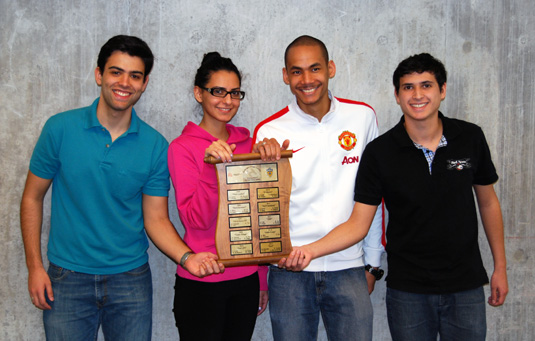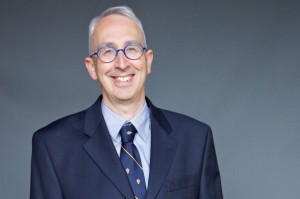Professor Steven Thorpe marks 10 years of guiding students through a journey of engineering design

MSE 558 winning project team 2014 (L to R): Renan Gomes (Science Without Borders – Brazil), Shahed Mirmohammadi (ECE), Jonathan Hoo (MSE) and Ricardo Barnasky (SWB – Brazil)
May 01, 2014
This year’s MSE 558 final design competition asked students to consider sustainable hydrogen infrastructures for niche market applications. While competency in technical design is highly regarded, the judging criteria also asked student teams to come up with a complete business plan that considered viability factors including environmental science, safety, economics and marketing.
“Successful engineering design involves a whole lot more than technical prowess,” said Professor Steven Thorpe who has taught MSE 558 for the last ten years. “Creating value and uptake requires careful planning and consideration of parameters far beyond traditional engineering principles.”
“Successful engineering design involves a whole lot more than technical prowess. Creating value and uptake requires careful planning and consideration of parameters far beyond traditional engineering principles.”
This year’s winning team, comprised of Materials Science & Engineering (MSE), Electrical & Computer Engineering (ECE) and two Science Without Borders students from Brazil, came up with a design for Zero Emission Combine Harvesters as a means of increasing sustainability in the Canadian agriculture sector. The concept involved the integration of a hydrogen fuel system as an eco-friendly alternative into existing combine harvester machinery. But the plan also included solutions to generate uptake from a range of other potential agricultural products and markets as well.
“In order for product development to succeed, engineers need to learn how to think and consider variables beyond technical specifications,” said Professor Thorpe. “The judging criteria have business and environmental components to them as well, and the winning team provided a blended delivery on all of them.”
“(This course) was an eye-opening experience as we were exposed to perspectives, skills, ideas and approaches that you don’t get from typical engineering projects or labs.”
The course is open to senior undergraduate and master’s students across the Faculty of Applied Science & Engineering with the intention of fostering a multi-disciplinary approach. Judges were also selected to reflect the same diversity in expertise, with industry representatives from aerospace giant Pratt & Whitney Canada and civil engineering firm, BA Group.

“The course project presented me with unfamiliar yet exciting challenges,” said Jonathan Hoo (MSE 1T0), a MSE Master of Engineering (MEng) student who was part of the winning team. “It really was an eye-opening experience as we were exposed to perspectives, skills, ideas and approaches that you don’t get from typical engineering projects or labs.”
“Teaching this class brings a different level of excitement for me every year,” said Yuri Savguira (MSE 1T1), a PhD candidate who has been a MSE 558 teaching assistant for several years. “Students taking this course come from a range of engineering backgrounds, so their approaches and solutions can vary drastically – and that’s what makes this course so invigorating.”
“Effective engineering design plays a critical role in improving quality of life on a global scale,” said Professor Thorpe. “I’m very delighted again to engage students from various engineering disciplines to collaborate, but also students from Science Without Borders – Brazil who provided valuable insights from a different part of the world.”